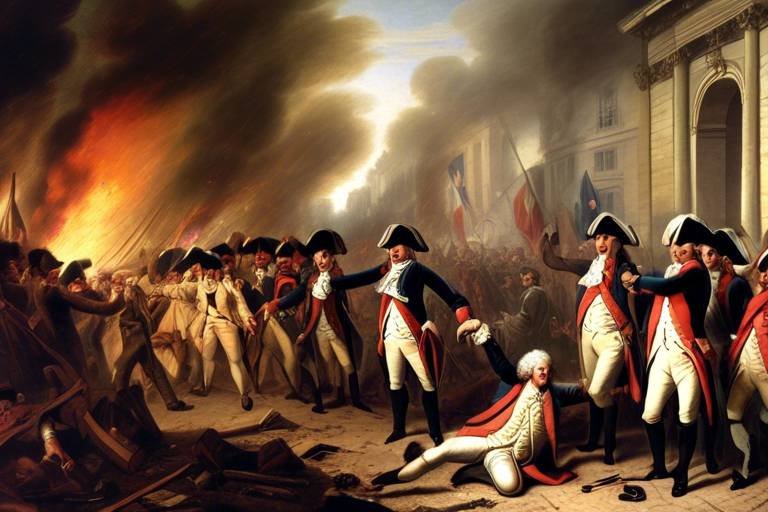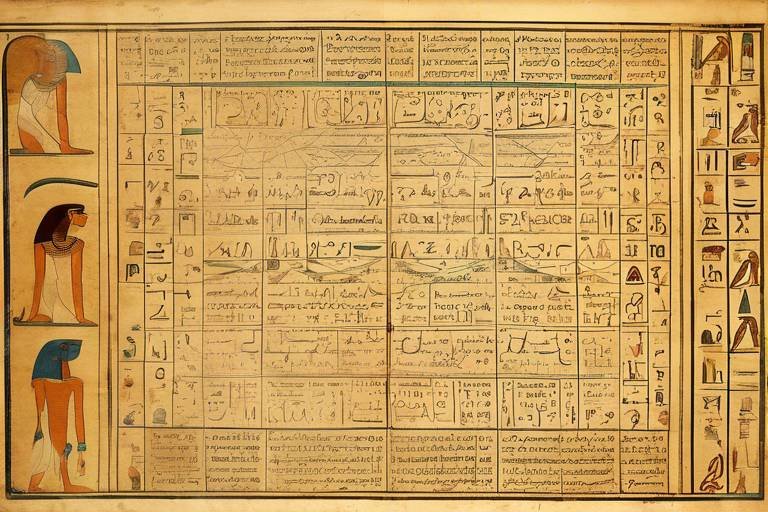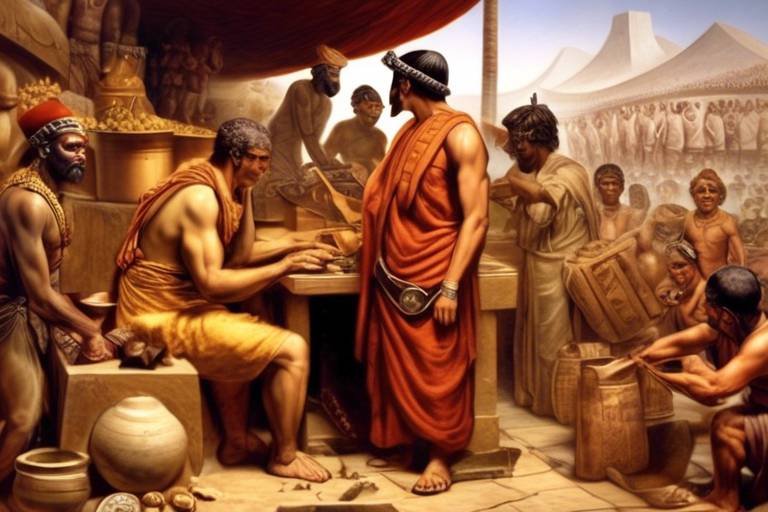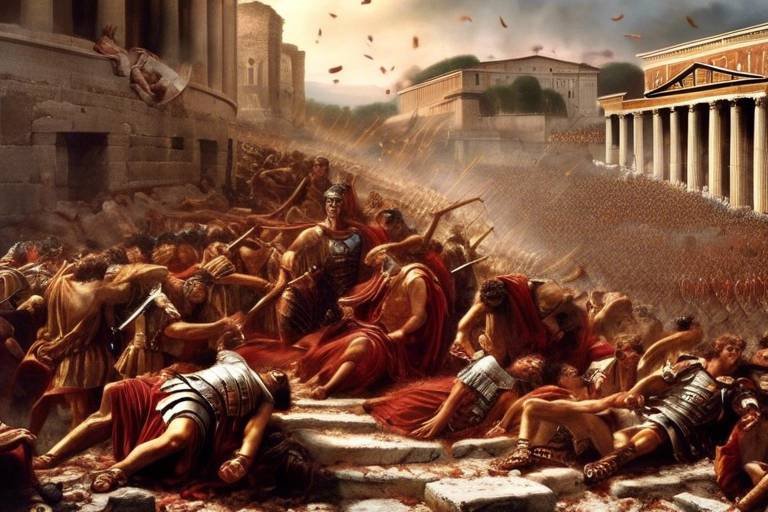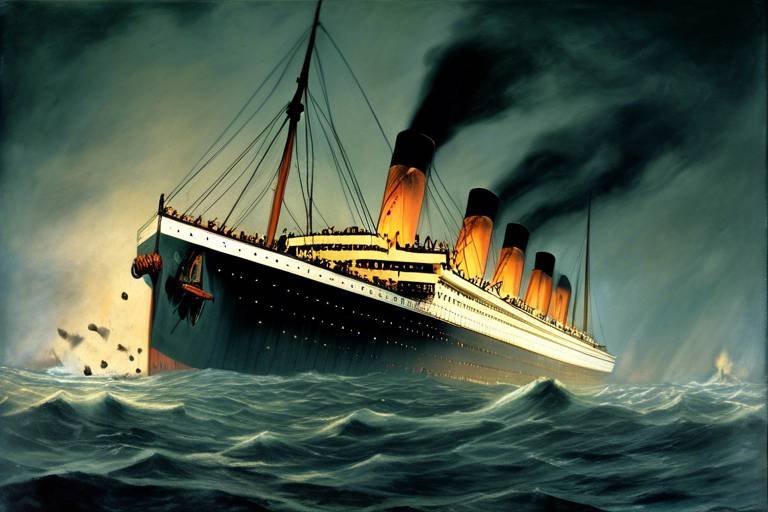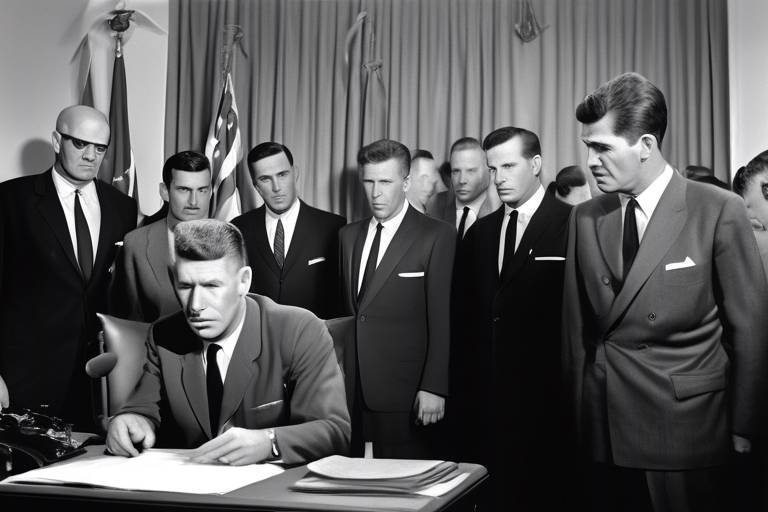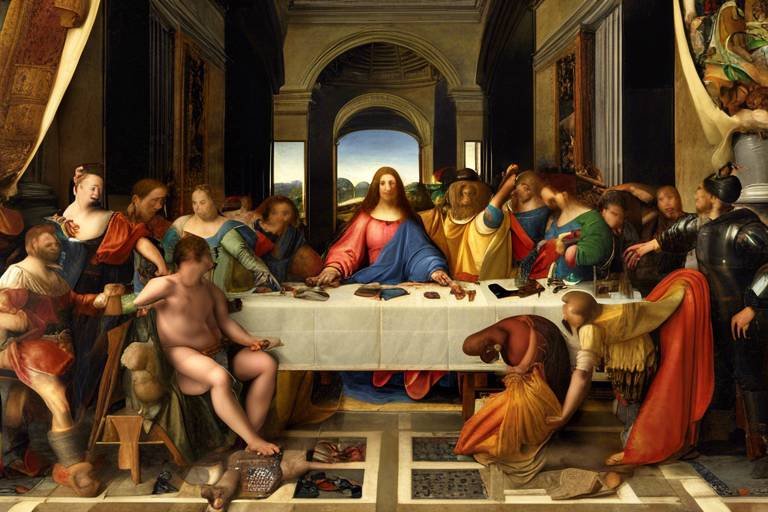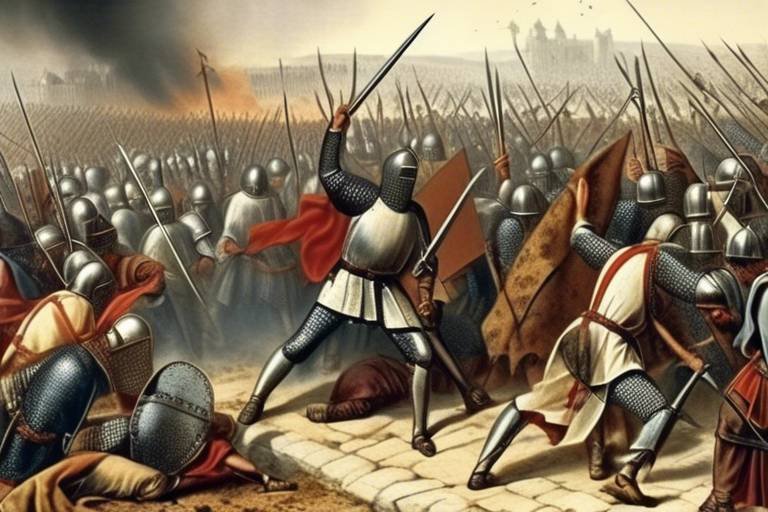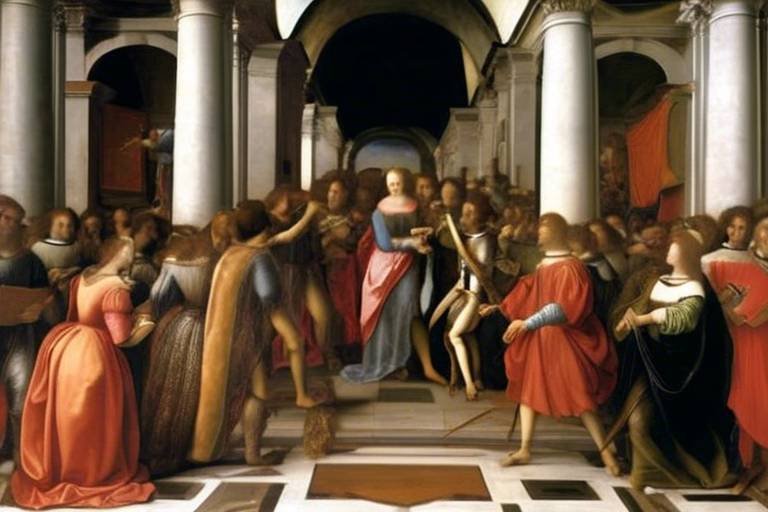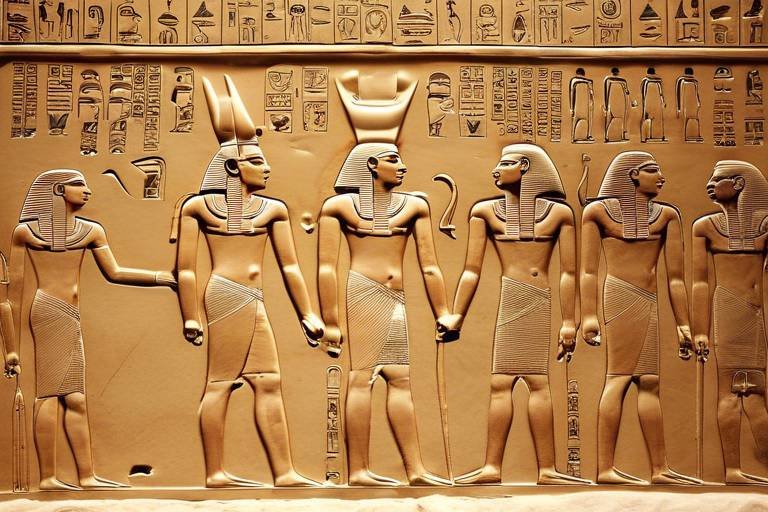The Causes and Effects of the French Revolution
The French Revolution was a turning point in history that reshaped the course of France and reverberated across the globe. It was a time of upheaval, change, and transformation that left an indelible mark on society. The revolution was not a sudden explosion but rather a culmination of various factors that had been simmering beneath the surface for years, waiting for the right spark to ignite.
Social inequality in France was a powder keg waiting to explode. The stark divide between the privileged nobility and clergy, who enjoyed lavish lifestyles and exemptions from taxes, and the common people, who bore the brunt of economic hardships and oppression, created a breeding ground for resentment and discontent. The festering anger among the lower classes was like a ticking time bomb, ready to detonate at any moment.
Economic hardships added fuel to the fire of revolution. The burden of heavy taxes, coupled with widespread poverty and economic instability, weighed heavily on the shoulders of the working class. As the gap between the haves and the have-nots widened, so did the calls for reform and justice. The economic grievances of the people were like sparks in a dry forest, igniting a blaze of revolution.
Political corruption and absolutism were like a dark cloud hanging over France, stifling the voices of the common people and breeding resentment. The unchecked power of the absolute monarchy, coupled with its corrupt practices and lack of representation for the masses, created a sense of injustice and oppression. The desire for political change and a more equitable system was like a storm brewing on the horizon, foretelling the coming revolution.
The rise of Enlightenment ideas acted as a catalyst for revolution. The principles of individual rights, liberty, and democracy championed by Enlightenment thinkers inspired a new wave of thought and action among the French populace. The seeds of revolution were sown in the fertile soil of enlightened ideals, nurturing a desire for change and progress.
The outbreak of the French Revolution in 1789 was like a thunderclap that reverberated across the nation. The storming of the Bastille symbolized the people's defiance against the oppressive monarchy and their demand for a new order. The revolution had begun, and there was no turning back.
The radical phase of the Revolution, epitomized by the Reign of Terror, was a period of extreme measures and violence in the name of revolutionary ideals. The guillotine became a symbol of both justice and terror, as the revolutionaries sought to purge the old order and build a new society from the ashes of the past.
Napoleon Bonaparte's rise to power marked a new chapter in French history. His ascent brought stability and order to a nation torn apart by revolution, but it also signaled the end of the revolutionary era. The age of authoritarian rule had begun, marking a shift in the political landscape of France and Europe.
The legacy of the French Revolution endures to this day, shaping the course of history for centuries. The rise of nationalism, the spread of democratic ideals, and the transformation of European society are all lasting effects of this pivotal moment in time. The echoes of the revolution can still be heard in the quest for equality, justice, and freedom around the world.

Social Inequality in France
The French Revolution was a pivotal period in history that shaped modern France. Understanding its causes and effects provides insight into the socio-political landscape of the time and its lasting impact on society today.
Rampant social inequality plagued France during the pre-revolution era. The stark divide between the privileged nobility and clergy, who enjoyed vast wealth and privileges, and the impoverished common people who faced hardship and oppression, created a powder keg of discontent waiting to explode. The aristocracy lived in luxury, exempt from taxes and bestowed with special rights, while the lower classes struggled to make ends meet. This stark contrast in living conditions and opportunities fueled deep-seated resentment among the French population, sowing the seeds of revolution.

Economic Hardships and Unrest
The French Revolution was a pivotal period in history that shaped modern France. Understanding its causes and effects provides insight into the socio-political landscape of the time and its lasting impact on society today.
Rampant social inequality, with the nobility and clergy enjoying privileges while the common people suffered, fueled discontent and resentment among the French population.
Amidst the opulence of the aristocracy, the lower classes in France faced dire economic hardships. The burden of high taxes, coupled with widespread poverty and economic instability, created a powder keg of unrest among the common people. The disparity in wealth and opportunities between the elite and the working class exacerbated the already simmering discontent, leading to widespread dissatisfaction and calls for reform.
The unchecked power of the absolute monarchy and the prevalence of corrupt practices further deepened the divide between the ruling class and the rest of society. The lack of representation for the common people in the political decision-making process only added fuel to the fire, creating a breeding ground for revolution.
The Enlightenment era brought forth revolutionary ideas centered around individual rights, liberty, and democracy. French thinkers and citizens were inspired by these principles to challenge the existing social and political structures that oppressed the majority of the population.
The pivotal moment of the French Revolution came with the storming of the Bastille in 1789. This symbolic act of rebellion marked the beginning of a movement where the people rose up against the monarchy, demanding fundamental change and an end to the oppressive regime.
As the Revolution progressed, a radical phase emerged, characterized by the Reign of Terror. Extreme measures and violence were employed in the pursuit of revolutionary ideals, leading to a period of intense upheaval and uncertainty.
Following the tumultuous period of the Revolution, Napoleon Bonaparte seized power and brought a semblance of stability to France. However, his ascent marked the end of the revolutionary era and the beginning of a new form of authoritarian rule that would shape the country's future trajectory.
The legacy of the French Revolution reverberates through history, influencing the rise of nationalism, the spread of democratic ideals, and the transformation of European society. Its impact continues to shape the course of history for centuries to come.

Political Corruption and Absolutism
The French Revolution was a pivotal period in history that shaped modern France. Understanding its causes and effects provides insight into the socio-political landscape of the time and its lasting impact on society today.
Rampant social inequality, with the nobility and clergy enjoying privileges while the common people suffered, fueled discontent and resentment among the French population.
Widespread poverty, high taxes, and economic instability burdened the lower classes, leading to widespread dissatisfaction and calls for reform.
The absolute monarchy's unchecked power and corrupt practices, coupled with a lack of representation for the common people, created a breeding ground for revolution.
The Enlightenment's emphasis on individual rights, liberty, and democracy inspired French thinkers and citizens to challenge the existing social and political structures.
The storming of the Bastille in 1789 marked the beginning of the French Revolution, as the people rebelled against the monarchy and demanded change.
The radical phase of the Revolution, characterized by the Reign of Terror, saw extreme measures and violence in the pursuit of revolutionary ideals.
Napoleon Bonaparte's ascent to power following the Revolution brought stability but also marked the end of the revolutionary era and the beginning of a new form of authoritarian rule.
The French Revolution's legacy includes the rise of nationalism, the spread of democratic ideals, and the transformation of European society, shaping the course of history for centuries to come.
During the French Revolution, political corruption and absolutism played a significant role in fueling discontent among the French population. The absolute monarchy, under the rule of King Louis XVI, wielded unchecked power and engaged in corrupt practices that prioritized the interests of the nobility and clergy over those of the common people.
This lack of representation for the lower classes and the concentration of power in the hands of the monarchy created a sense of injustice and inequality that permeated French society. The rigid social hierarchy and the oppressive nature of absolutism stifled any attempts at reform or progress, further exacerbating the grievances of the populace.
Moreover, the corruption within the political system, where positions of power were often bought or inherited rather than earned on merit, eroded public trust in the government and fueled calls for change. The aristocracy's lavish lifestyle contrasted sharply with the poverty and hardship experienced by the majority of the French population, highlighting the stark inequalities present in society.
As discontent grew and calls for reform intensified, the stage was set for the eruption of the French Revolution, a transformative period in history that would forever alter the political landscape of France and reverberate across Europe.

Rise of Enlightenment Ideas
The French Revolution was a pivotal period in history that shaped modern France. Understanding its causes and effects provides insight into the socio-political landscape of the time and its lasting impact on society today.
Rampant social inequality, with the nobility and clergy enjoying privileges while the common people suffered, fueled discontent and resentment among the French population.
Widespread poverty, high taxes, and economic instability burdened the lower classes, leading to widespread dissatisfaction and calls for reform.
The absolute monarchy's unchecked power and corrupt practices, coupled with a lack of representation for the common people, created a breeding ground for revolution.
The Enlightenment's emphasis on individual rights, liberty, and democracy inspired French thinkers and citizens to challenge the existing social and political structures.
The storming of the Bastille in 1789 marked the beginning of the French Revolution, as the people rebelled against the monarchy and demanded change.
The radical phase of the Revolution, characterized by the Reign of Terror, saw extreme measures and violence in the pursuit of revolutionary ideals.
Napoleon Bonaparte's ascent to power following the Revolution brought stability but also marked the end of the revolutionary era and the beginning of a new form of authoritarian rule.
The French Revolution's legacy includes the rise of nationalism, the spread of democratic ideals, and the transformation of European society, shaping the course of history for centuries to come.

Outbreak of the Revolution
The French Revolution was a pivotal period in history that shaped modern France. Understanding its causes and effects provides insight into the socio-political landscape of the time and its lasting impact on society today.
Rampant social inequality, with the nobility and clergy enjoying privileges while the common people suffered, fueled discontent and resentment among the French population.
Widespread poverty, high taxes, and economic instability burdened the lower classes, leading to widespread dissatisfaction and calls for reform.
The absolute monarchy's unchecked power and corrupt practices, coupled with a lack of representation for the common people, created a breeding ground for revolution.
The Enlightenment's emphasis on individual rights, liberty, and democracy inspired French thinkers and citizens to challenge the existing social and political structures.
The outbreak of the French Revolution was marked by the iconic storming of the Bastille in 1789. This event symbolized the people's rebellion against the monarchy and their fervent demand for change. The Bastille's fall not only represented the physical overthrow of a symbol of royal authority but also ignited a spark that would set the revolution in motion.
The radical phase of the Revolution, known as the Reign of Terror, was a period of intense violence and political purges. Led by figures like Maximilien Robespierre, the revolutionary government executed thousands of perceived enemies of the revolution in the name of preserving its ideals. This extreme measure of governance aimed to eliminate opposition and consolidate power but also instilled fear and uncertainty among the populace.
Following the tumultuous period of the Revolution, Napoleon Bonaparte emerged as a powerful figure in French politics. His military successes and strategic acumen propelled him to become the leader of France, eventually declaring himself Emperor. Napoleon's rule brought stability to a country weary from years of upheaval, but it also marked the transition from revolutionary fervor to a new era of authoritarian rule.
The legacy of the French Revolution reverberates through history, influencing the rise of nationalism, the spread of democratic ideals, and the transformation of European society. The principles of liberty, equality, and fraternity espoused during this period continue to shape modern political discourse and societal values, leaving an indelible mark on the course of human progress.

Reign of Terror and Radicalization
The Reign of Terror during the French Revolution was a period of extreme violence and radicalization that gripped France in fear and uncertainty. Led by the radical Jacobins, the Committee of Public Safety, headed by Maximilien Robespierre, initiated a ruthless campaign to eliminate perceived enemies of the revolution.
Under the guise of protecting the revolution from internal and external threats, the Reign of Terror saw the establishment of revolutionary tribunals that handed out swift and severe justice, often without due process. The guillotine became a symbol of terror as thousands of individuals, including former revolutionaries, nobility, clergy, and ordinary citizens, met their end at the blade.
The radicalization of the Revolution reached its peak during this period, with revolutionary fervor turning into paranoia and suspicion. Citizens lived in constant fear of being denounced as traitors or counter-revolutionaries, leading to a climate of distrust and betrayal.
The Reign of Terror also witnessed the rise of figures like Robespierre, who wielded unchecked power and justified extreme measures in the name of protecting the revolution. The revolutionary government's authoritarian tactics and suppression of dissent highlighted the darker side of the quest for liberty and equality.
Despite its brutal methods, the Reign of Terror ultimately sowed the seeds of its own downfall. The excesses and atrocities committed during this period alienated many within France and abroad, leading to growing opposition to the radical Jacobin regime.
In the end, the Reign of Terror came to an abrupt halt with the fall of Robespierre and the Thermidorian Reaction, marking the beginning of a new phase in the French Revolution. The legacy of this dark chapter serves as a cautionary tale of the dangers of unchecked power and ideological extremism in times of upheaval.

Napoleon's Rise to Power
The French Revolution was a pivotal period in history that shaped modern France. Understanding its causes and effects provides insight into the socio-political landscape of the time and its lasting impact on society today.
Rampant social inequality, with the nobility and clergy enjoying privileges while the common people suffered, fueled discontent and resentment among the French population.
Widespread poverty, high taxes, and economic instability burdened the lower classes, leading to widespread dissatisfaction and calls for reform.
The absolute monarchy's unchecked power and corrupt practices, coupled with a lack of representation for the common people, created a breeding ground for revolution.
The Enlightenment's emphasis on individual rights, liberty, and democracy inspired French thinkers and citizens to challenge the existing social and political structures.
The storming of the Bastille in 1789 marked the beginning of the French Revolution, as the people rebelled against the monarchy and demanded change.
The radical phase of the Revolution, characterized by the Reign of Terror, saw extreme measures and violence in the pursuit of revolutionary ideals.
Following the tumultuous period of the Revolution, Napoleon Bonaparte emerged as a prominent figure in French politics. His military prowess and strategic acumen propelled him to power, eventually leading to his crowning as Emperor of France in 1804. Napoleon's rise to power not only brought stability to a war-torn nation but also marked a significant shift in governance from revolutionary chaos to authoritarian rule.
The French Revolution's legacy includes the rise of nationalism, the spread of democratic ideals, and the transformation of European society, shaping the course of history for centuries to come.
Q: What were the main causes of the French Revolution?
A: The main causes of the French Revolution were social inequality, economic hardships, political corruption, and the rise of Enlightenment ideas.
Q: What were the key events of the French Revolution?
A: Key events of the French Revolution include the storming of the Bastille, the Reign of Terror, and Napoleon's rise to power.
Q: How did the French Revolution impact modern society?
A: The French Revolution had a lasting impact on modern society by promoting democratic ideals, inspiring nationalist movements, and reshaping the political landscape of Europe.

Legacy of the French Revolution
The French Revolution was a pivotal period in history that shaped modern France. Understanding its causes and effects provides insight into the socio-political landscape of the time and its lasting impact on society today.
Rampant social inequality, with the nobility and clergy enjoying privileges while the common people suffered, fueled discontent and resentment among the French population.
Widespread poverty, high taxes, and economic instability burdened the lower classes, leading to widespread dissatisfaction and calls for reform.
The absolute monarchy's unchecked power and corrupt practices, coupled with a lack of representation for the common people, created a breeding ground for revolution.
The Enlightenment's emphasis on individual rights, liberty, and democracy inspired French thinkers and citizens to challenge the existing social and political structures.
The storming of the Bastille in 1789 marked the beginning of the French Revolution, as the people rebelled against the monarchy and demanded change.
The radical phase of the Revolution, characterized by the Reign of Terror, saw extreme measures and violence in the pursuit of revolutionary ideals.
Napoleon Bonaparte's ascent to power following the Revolution brought stability but also marked the end of the revolutionary era and the beginning of a new form of authoritarian rule.
The French Revolution's legacy is profound and far-reaching. It includes the rise of nationalism, the spread of democratic ideals, and the transformation of European society. The revolution sparked a wave of change that reverberated across nations, shaping the course of history for centuries to come.
Frequently Asked Questions
- What were the main causes of the French Revolution?
The main causes of the French Revolution included social inequality, economic hardships, political corruption, and the rise of Enlightenment ideas. These factors combined to create a volatile environment ripe for revolution.
- How did social inequality contribute to the French Revolution?
Social inequality in France, with the privileged nobility and clergy exploiting the common people, led to widespread discontent and resentment. The stark contrast in living conditions and opportunities fueled the desire for change and equality among the French population.
- What role did the storming of the Bastille play in the French Revolution?
The storming of the Bastille in 1789 symbolized the beginning of the French Revolution, signifying the people's defiance against the monarchy and their demand for reform. It sparked a series of events that eventually led to the overthrow of the absolute monarchy.
- How did Napoleon Bonaparte impact the aftermath of the French Revolution?
Napoleon Bonaparte's rise to power following the French Revolution brought stability to France but also marked the end of the revolutionary era. His authoritarian rule reshaped the political landscape and set the stage for a new chapter in French history.
- What are some lasting legacies of the French Revolution?
The French Revolution's legacy includes the rise of nationalism, the spread of democratic ideals, and the transformation of European society. It laid the foundation for modern political ideologies and influenced revolutions worldwide.

